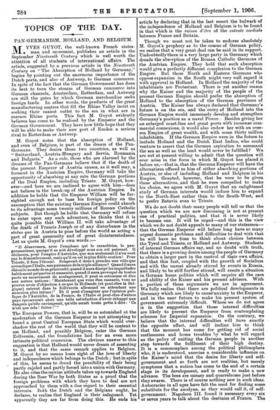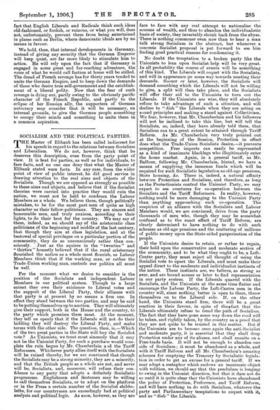TOPICS OF THE DAY.
PAN-GERMANISM, HOLLAND, AND BELGIUM.
M'YVES GUYOT, the well-known French states- • man and economist, publishes an article in the September Nineteenth Century which is well worth the attention of all students of international affairs. The article, suggested by a previous article in the Nineteenth Century on "The Absorption of Holland by Germany," begins by pointing out the enormous importance of the Dutch ports, and also of Antwerp, to German commerce. In spite of the fact that the German Government has done its best to turn the stream of German commerce into German channels, Amsterdam, Rotterdam, and Antwerp are still the gates by which German merchandise seeks foreign lands. In other words, the products of the great manufacturing centres that fill the Rhine Valley insist on seeking their easiest outlet to the sea in what are in essence Rhine ports. This fact M. Guyot evidently believes has come to be realised by the Emperor and the German Government. They have now little hope that they will be able to make their new port of Emden a serious rival to Rotterdam or Antwerp.
M. Guyot notes that the absorption of Holland, and even of Belgium, is part of the dream of the Pan- Germans. They desire those two countries, as well as "Switzerland, Austria-Hungary and Servia, Roumania and Bulgaria." As a rule, those who are alarmed by the dreams of the Pan-Germans believe that if the death of the present Emperor of Austria causes, as it well may. a ferment in the Austrian Empire, Germany will take the opportunity of absorbing at any rate the German portions of the Dual Empire, including Trieste. M. Guyot, how- ever—and here we are inclined to agree with him—does not believe in the break-up of the Austrian Empire. In addition he holds that the Emperor William will be far- sighted enough not to base his foreign policy on the assumption that the existing German Empire could absorb to its advantage some twenty millions of Roman Catholic subjects. But though he holds that Germany will refuse to enter upon any such adventure, he thinks that it is quite possible that William II. will take advantage of the death of Francis Joseph or of any disturbance in the status quo in Austria to pose before the world as acting a part of great generosity and of great disinterestedness. Let us quote M. Guyot's own words :— "fl desavonera, avec remphase qui le caractkrise, le pan- germanisme, quoiqu'il se soit developpe sous son coil paternel. Ii declarers, pour l'empire d'Antriche, quo non seulement ii n'en rout pas le demembrement, mais pill en eat le plus fidele soutien! Pour Trieste, il fern Monne. Songerait-il done 1 prendre une vile que revendique l'Italie, une puissance de la triple alliance Quand il aura ebloui le monde de an generosite, quand il aura dissipe lea inquietudes habilement preparees et amassees, quand il aura provoque de t,outes parts un monvement de soulagement, il pent se retoarner et dire aux antres nations: Maintenant que vous etes rassures, vons no ponvez avoir d'objection e. co que in Hollande (et peut-etre In Bel- gique) entrent dans le Zollverein allemand en attendant une annexion plus intime !' Et il pent s'imaginer que ropinion pub- lique de l'Autriche, de In Prance, de l'Italie et peut-etre d'autres pays epronverait alors une telle satisfaction d'avoir echappe aux dangers qu'elle envisagesit, qu'elle serait touts prete it dire :'Co n'est que cola! faites The European Powers, that is, will be so astonished at the moderation of the German Emperor in not attempting to found a great Central European State which would over- shadow the rest of the world that they will be content to see Holland, and possibly Belgium, enter the German Zollverein, and the foundations laid for an even more intimate political connexion. The obvious answer to this suggestion is that Holland would never dream of assenting to it, and that the same remark applies to Belgium. M. Guyot by no means loses sight of the love of liberty and independence which belongs to the Dutch; • but in spite of this, he seems to dread the possibility of their being partly cajoled and partly forced into a union with Germany. He also cites the unwise attitude taken up towards England during the Boer War by both States as a proof that the foreign problems with which they have to deal are not approached by them with a due regard to their essential interests. Both the Dutch and the Belgians ought, he declares, to realise that England is their safeguard. Yet apparently they are far from doing this. He ends his article by declaring that in the last resort the bulwark of the independence of Holland and Belgium is to be found in that which is the raison d'etre of the entente cordials between France and Britain.
Though we must not be taken to endorse absolutely M. Guyot's prophecy as to the course of German policy, we realise that a very great deal can be said in its support. Undoubtedly there is a very large party in Germany which dreads the absorption of the Roman Catholic Germans of the Austrian Empire. They hold that such absorption would give a perfectly different complexion to the German Empire. But those North and. Eastern Germans who oppose expansion in the South might very well regard it with approval in Holland. In Holland the majority of the inhabitants are Protestant. There is yet another reason why the Kaiser and the majority of the people of the present German Empire should prefer the absorption of Holland to the absorption of the German provinces of Austria. The Kaiser has always declared that Germany's future is on the sea, and the entry of Holland into the German Empire would immensely develop and strengthen Germany's position as a naval Power.. Besides giving her an enlarged coast-line and great ports with immense com- mercial connexions, it would also endow her with an over- sea Empire of great wealth, and with some thirty million inhabitants. If the German Empire were in the future to include Holland and the Dutch East Indies, who could venture to assert that the German aspiration to command the sea as well as the land would never be fulfilled? We are not at present willing to admit that the question will ever arise in the form in which M. Guyot has placed it before us,—that is, that the German Emperor will have the alternating offered to him of either absorbing portions of Austria, or else of including Holland and Belgium in his Empire. Granted, however, that he were to be given these alternatives, and that he were compelled to make his choice, we agree with M. Guyot that an enlightened study of German interests would induce him to expand to the North-East rather than to the South-West, and. to prefer Batavia even to Trieste.
We do not doubt that- many people will tell us that the question which we are now discussing is not at present one of practical politics, and that it is never likely to become one. It will be urged—and this is the view which we do not doubt appeals to many of our statesmen— that the German Emperor will before long have so many urgent domestic problems and difficulties to deal with that he will have no time to think about choices between the Tyrol and Trieste, or Holland and Antwerp. Students of internal German affairs say, and no doubt with truth, that there is a growing desire among the people of Germany to obtain a larger part in the control of their own affairs, and that this fact, coupled with the growth of Socialism and with the unrest already stirred by events in Russia, and likely to be still further stirred, will create a situation in German home politics which will require all the care and ability of the Kaiser and his present advisers. With a portion of these arguments we are in agreement. We fully realise that there are political developments in Germany which are likely to cause' anxiety to the Emperor, and in the near future to make his present system of government extremely 'difficult. Where we do not agree is in the suggestion that those internal difficulties are likely to prevent the Emperor from contemplating schemes for Imperial expansion. On the contrary, we believe that the internal difficulties will have exactly the opposite effect, and will incline him to think that the moment has come for getting rid of social restlessness and home troubles by what he will regard. as the policy of uniting the German people in another step towards the fulfilment of their high destiny. It is a commonplace among the political philosophers who, it is understood, exercise a considerable influence on the Kaiser's mind that the desire for liberty and self- government and so forth are not realities, but merely symptoms that a nation has come to the end of a certain stage in its development, and is ready to make a new advance. The bees are uneasy and quarrelsome just before they swarm. There is of course nothing new in such ideas. Autocracies in all ages have felt the need for finding some substitute for the anodyne, as they would call it, of self- government. Napoleon III. found it necessary every six or seven years to talk about the destinies of France. The fact that English Liberals and Radicals think such ideas old-fashioned, or foolish, or ruinous; or what you will, does not, unfortunately, prevent them from being entertained in places such as Berlin, where democratic ideals are by no means in favour.
We hold, then, that internal developments in Germany, instead of giving any security that German Emperor will keep quiet, are far more likely to stimulate him to action. He will rely upon the fact that if Germany is engaged in some great and far-reaching adventure, the voice of what he would call faction at home will be stilled. The dread of French revenge has for thirty years tended to unite the German Empire, and to keep down the demands of those who desire true self-government and the establish- ment of a liberal polity. Now that the fear of such revenge is dying out, partly owing to the obviously pacific character of the French Republic, and partly to the eclipse of her Russian ally, the supporters of German autocracy may consider that it will be necessary, on internal grounds, to give the German people something to occupy their minds and something to unite them in a common aspiration.



































 Previous page
Previous page